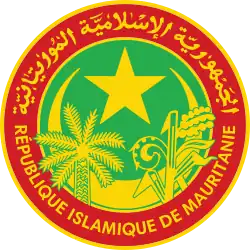| |||||||||||||||||||||||||||||||||||||||||||||||||||||||
All 176 seats in the National Assembly 89 seats needed for a majority | |||||||||||||||||||||||||||||||||||||||||||||||||||||||
| |||||||||||||||||||||||||||||||||||||||||||||||||||||||
 |
|---|
|
|
|
|
The next Mauritanian parliamentary election will be held by 2028 to elect the 176 seats of the 11th National Assembly of Mauritania.
Electoral system
The 176 members of the National Assembly are be elected by two methods (with Mauritanians being able to cast four different votes in a parallel voting system); 125 are elected from single- or multi-member electoral districts based on the departments (or moughataas) that the country is subdivided in[lower-alpha 1] (which the exception of Nouakchott, which is divided in three 7-seat constituencies based on the three regions (or wilayas) the city is subdivided in[1] using either the two-round system or proportional representation; in single-member constituencies candidates require a majority of the vote to be elected in the first round and a plurality in the second round. In two-seat constituencies, voters vote for a party list (which must contain one man and one woman); if no list receives more than 50% of the vote in the first round, a second round is held, with the winning party taking both seats. In constituencies with three or more seats, closed list proportional representation is used, with seats allocated using the largest remainder method.[3] For three-seat constituencies, party lists must include a female candidate in first or second on the list; for larger constituencies a zipper system is used, with alternate male and female candidates.[3]
The Mauritania diaspora gets allocated four seats, with this election being the first time Mauritanians in the diaspora are able to directly elect their representatives.[1]
The remaining 51 seats are elected from three nationwide constituencies, also using closed list proportional representation: a 20-seat national list (which uses a zipper system), a 20-seat women's national list and a new 11-seat youth list (with two reserved for people with special needs), which also uses a zipper system to guarantee the representation of women.[1][3]
Notes
References
- 1 2 3 4 "نص الاتفاق النهائي بين وزارة الداخلية والأحزاب السياسية" [The text of the final agreement between the Ministry of the Interior and political parties]. AlAkhbar.info (in Arabic). 27 September 2022. Retrieved 4 October 2022.
- ↑ Edition of the Official Journal of the Islamic Republic of Mauritania carrying the decrees establishing the new departments (in French)
- 1 2 3 Electoral system IPU
_(cropped).jpg.webp)